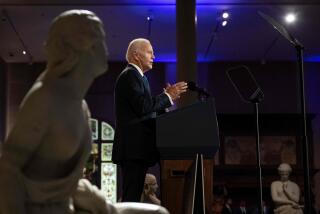What Bill Should Say to Boris : A band of economists want to head off the recovery before it hits its stride.
- Share via
The pain that Russia’s economic reform inflicts on its average citizen was clearly reflected in the recent election in which right-wing and anti-reform parties gained at the expense of President Boris N. Yeltsin’s followers and of economic reformers in general. Not surprisingly, Yeltsin has responded by saying that he will slow the pace of reform and do more to raise the Russian standard of living.
While saying that may be good politics for Yeltsin, actually slowing the pace of reform would be bad economics. Russia was on the right track before the election and should not abandon its progress in developing a market economy. That is the message that President Clinton should bring to Moscow.
Unfortunately, that is not the message that senior U.S. officials have been sending in recent weeks. When Vice President Gore was in Moscow, he criticized the International Monetary Fund’s support of rapid privatization and tough anti-inflationary policy. And Strobe Talbott, now the second in command in the State Department, recently quipped that the Russians need a policy with less shock and more therapy.
Because the dissatisfaction of the Russian people and the inequities that have developed in their private sector have been well publicized, it is easy to overlook the real progress toward a market economy over the past year. In fact, two key reforms have been introduced.
First, there has been significant progress in privatizing existing enterprises and in allowing new private enterprises. More than a third of all Russian employees now work for firms that have in some sense been privatized. Second, most prices have been decontrolled, allowing supply and demand to determine them. This has eliminated artificial scarcity, bringing consumer goods back to store shelves.
Only such fundamental economic reform can raise the Russian standard of living to that of the major Western countries. Now, Russia’s per-capita income is less than half that in the countries of Western Europe.
Seventy-five years of communism have left a mis-structured economy that resists change. Under the communist system, economic decisions were based on the wrong prices and incentives. Managers and workers now continue to work with antiquated plants and equipment. Many find it difficult to give up old habits best summed up by a worker’s comment that under communism, “They pretended to pay us and we pretended to work.”
Even in eastern Germany, the most efficient of the communist economies, moving to a market economy has meant firing two out of three workers in newly privatized industrial companies. It is inevitable that there will be further job losses and income reductions in Russia until resources have been redeployed more productively in response to market prices.
Further pain will also be necessary to bring down the high rate of inflation. Until now, Yeltsin has been unable to force the Russian Central Bank to stop its inflationary policies. Instead of limiting credit, it has continued to lend to bankrupt corporations to bail out managements.
The slower pace of reform that Yeltsin has spoken of would not make it any easier or less painful to achieve a market economy. Experience in other former communist countries shows the benefit of not delaying reform. Although Poland and the Baltic countries suffered substantially during the first years of reform, they are now enjoying a general recovery with increasing prosperity. In contrast, Ukraine and Romania, where reform has been delayed, are experiencing painfully chaotic conditions.
The political costs of a prolonged restructuring could well prove to be higher than the costs of a quick though severe one. Extending the timetable might only increase the political opposition to reform. Economics and politics both conclude that the sooner and quicker, the better.
Unfortunately, the pain of correcting the errors of 75 years cannot be significantly reduced by foreign aid, even if the United States and other Western governments made very generous gifts. Since Russia has a population of more than 250 million people, each $1 billion of aid adds less than $4 to per-capita income in a country where average income is now about $7,000. Even the very implausible $25 billion of aid that some have advocated would raise Russian incomes by less than 2%.
In the end, there is little the West can or should do to affect Russian economic reform. The decision of what to do and how fast to move must be left to the Russian government. But Clinton should be clear that there is no viable alternative to a market economy and that rapid reform is more likely to succeed.
More to Read
Get the L.A. Times Politics newsletter
Deeply reported insights into legislation, politics and policy from Sacramento, Washington and beyond. In your inbox three times per week.
You may occasionally receive promotional content from the Los Angeles Times.










